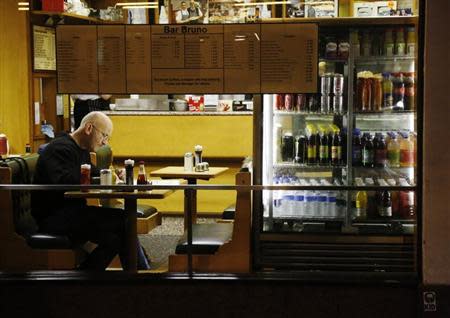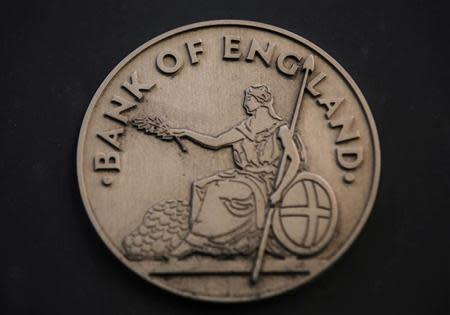UK inflation undershoots Bank of England target for first time since 2009
By Andy Bruce and David Milliken LONDON (Reuters) - British inflation fell below the Bank of England's target for the first time in over four years last month, reinforcing the bank's message that there is no rush to raise interest rates. Consumer prices rose 1.9 percent on the year in January, slowing from December's rate of 2.0 percent, making it the smallest increase since November 2009, the Office for National Statistics said. Economists polled by Reuters had expected it to stay at 2.0 percent, although the lower rate of inflation fitted with the BoE's latest forecasts showing it would dip to around 1.7 percent by March. "With sterling remaining strong, pushing down import costs, energy and commodity prices remaining well behaved and wage pressures limited, inflation is likely to remain soft for several months," said ING economist James Knightley. "We do expect to see an uptick later this year with a strengthening labour market likely prompting a gradual rise in wages ... but it is not going to be troubling for the BoE." Before December last year, annual inflation exceeded the Bank of England's 2 percent target every month since December 2009, eroding the spending power of households and making the fall in living standards a big political issue ahead of next year's elections. In a rare comment after inflation figures, Prime Minister David Cameron said the decline showed the government's long-term economic plan was working. Last Wednesday the Bank said it was in no rush to hike rates and that it would look for a range of measures to show less slack in Britain's labour market before it tightens policy. Tuesday's figures are likely to reinforce that position, despite house price figures released alongside the consumer inflation numbers that showed the annual rate of house price growth had returned to October's three-year high. The central bank has said it will use measures other than raising rates to tame house prices if they threaten to get out of control. Sterling fell back after the data while gilts extended gains. CHEAPER CLOTHES, FURNITURE The ONS said the biggest negative contribution to the annual consumer price inflation rate in January was from clothing, spirits, furniture and household goods and DVDs. An underlying measure of inflation, which strips out increases in energy, food, alcohol and tobacco, rose by 1.6 percent in January compared with the same month last year, its smallest increase since June 2009. Compared with the previous month, the consumer price index in January fell 0.6 percent, reflecting seasonal discounting. Data also released by the ONS on Tuesday showed factory gate prices rose by 0.9 percent in annual terms, slightly faster than economists' predictions of a 0.7 percent increase. Core producer prices rose 1.2 percent, their biggest annual increase since May 2012, but this may start to ease as manufacturers' raw material costs showed their biggest annual fall since September 2009. House prices across Britain rose by 5.5 percent in the 12 months to December, up from 5.4 percent in November, the ONS also said on Tuesday. Increases were concentrated in London, where prices were 12.3 percent higher than a year earlier, the biggest rise August 2010. But excluding the capital, prices in Britain were just 3.3 percent higher. The Bank last month ended one of Britain's programmes aimed at stimulating mortgage lending and has stressed it will keep a close eye on the housing market amid fears of a property bubble. The ONS measure of house prices in the 12 months to December compared with increases of 8.8 and 7.3 percent reported for January by lenders Nationwide and Halifax. The lenders' figures are based on prices at an earlier stage of the purchasing process than the ONS numbers, and so tend to act as a leading indicator. (Editing by Jeremy Gaunt)

 Yahoo Finance
Yahoo Finance 

